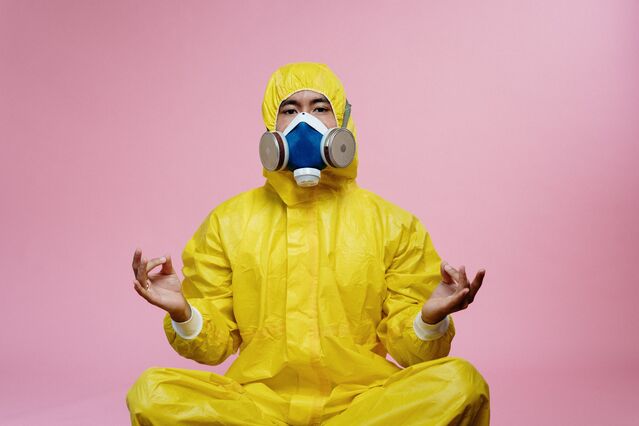OCD
Finally, My OCD Is Useful
How COVID-19 made me appreciate my OCD—well, sort of.
Posted February 2, 2021

Obsessive-compulsive disorder, or OCD, is by its very nature excessive. Most people don’t need to wash their hands 20 times a day. Or make sure a light is turned off 10 times because it’s 10 o’clock. Or do as I do and check, repeatedly, if the meat I’m about to eat is fully cooked.
“You sure, it looks a little pink.”
“It’s fine,” my wife repeats, exasperated.
OCD is a mental illness defined by its excess, so I often wonder: Why does it exist? What purpose would my OCD have in the grand game of evolution? Was there a reason, I wonder, why a Paleolithic cave dude named Ug might have fared better with OCD than without? Or perhaps, it’s nothing. It is purely useless madness brought on by living in our post-modern age.
I was diagnosed with OCD nearly 15 years ago and I’ve named my OCD "Steve." We’re close. And for all that time it’s felt pretty purposeless, like being kicked repeatedly when you’re already on the ground. That is until COVID-19 hit, because all of a sudden, for a few months, it felt like: hey, maybe Steve is useful.
For example, Steve had me wearing masks before they were cool. Of course, I was wearing them because I had a somewhat-irrational anxiety about air pollution in my, relatively speaking, clean-air city. But having worn masks around town before, it was no big jump to wear them every time I went into public.
Also, I had no problemo with 6-feet-apart. As someone with social anxiety, standing 6 feet from strangers is pretty much my go-to behavior.
Nor was it a big deal to wash my hands more frequently. Now, I know for others with OCD this was a problem. But for me—for whom fortunately washing hands had never been one of Steve’s calling cards—it wasn’t hard to step up the game.
And, oh you want me to get a vaccine? Hell yeah. I love vaccines. They are one of my favorite things. As a world-traveling journalist, I’ve gotten every vaccine recommended and extras just in case.
During this strange Steve-fest of 2020, I found the behavior of other non-OCD humans quite perplexing, What, you don’t want to wear a mask? I mean, you know there’s a pandemic, right? You know people are dying in complete and utter agony, yeah? Wait, you’re planning to do what? Eat in a restaurant? Like … indoors!? You’ve seen the study out of China right, where they show how the virus leaps from table to table like an Olympic gymnast?
OCD made it really easy for me to become a model COVID-19 citizen: listening to the advice of actual experts, heeding warnings, and generally trying to do my part to not take up a bed at the ICU. At first—at first—I didn’t go too overboard.
So, around May the idea started to poke at me. Maybe OCD really does have some evolutionary explanation? Maybe OCD Paleolithic Ug avoided eating that mushroom soup that made everyone else in the tribe, you know, die. Maybe Medieval OCD Katherine made it through the black plague because her hovel was spick-and-span—all rats (and fleas) and humans banished. Perhaps, 18th century OCD solider Samuel politely suggested to the surgeon to amputate his bayonetted leg before the doctor even got a look. And perhaps he was right.
Maybe, just maybe, OCD was a kind of messed-up superpower, a way some of our ancestors avoided disease and death, because their brains were excessively attuned to any and every possible danger. Sure, some of them probably also went crazy—unquestionably so—but maybe they also didn’t die young? Is it possible OCD had an evolutionary purpose?
Of course, eventually, like with all things OCD, this vague usefulness descended into extremes. As the pandemic dragged on, my OCD worsened. Several times I was convinced my family all had COVID-19, I couldn’t sleep without COVID nightmares ("Wait … what am I doing in this movie theatre? How’d I forget about the pandemic?”), and I’d check COVID numbers only about 30 times a day. In the last few months, Steve convinced me, ludicrously, that a rash was bed stores and nearly called an ambulance when I thought my kid had appendicitis (she didn’t).
Now, coronavirus exhaustion has set in, the endless days with little-to-no novelty, the added stressors, responsibilities, and uncertainties—and I no longer care whether or not OCD is sort of useful. Like all of us, I just want my life back the way it was. I want to be able to eat out again, see friends again, send my kid to school again. I want to be alone in my house again, without my kid shadowing my steps. I want a world where a person didn’t wake up one morning and decide: "You know what I want to do today? I want to eat a bat."
Sure, maybe OCD did come from some evolutionary experiment—or maybe it didn’t—but I’m chasing bigger and better things: Sanity. Happiness. Mental balance. Hope.
I am an award-winning environmental journalist and author of Baggage: Confessions of a Globe-Trotting Hypochondriac.




